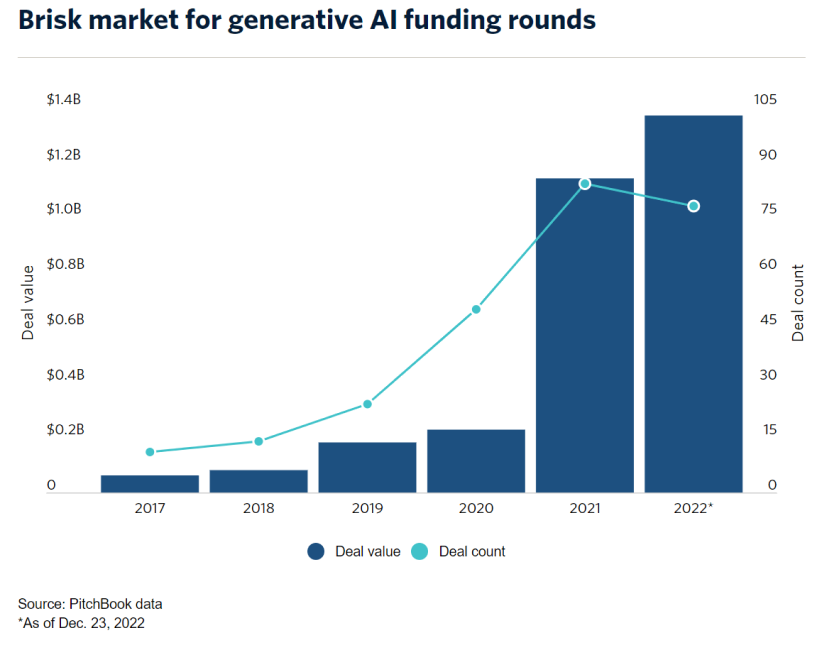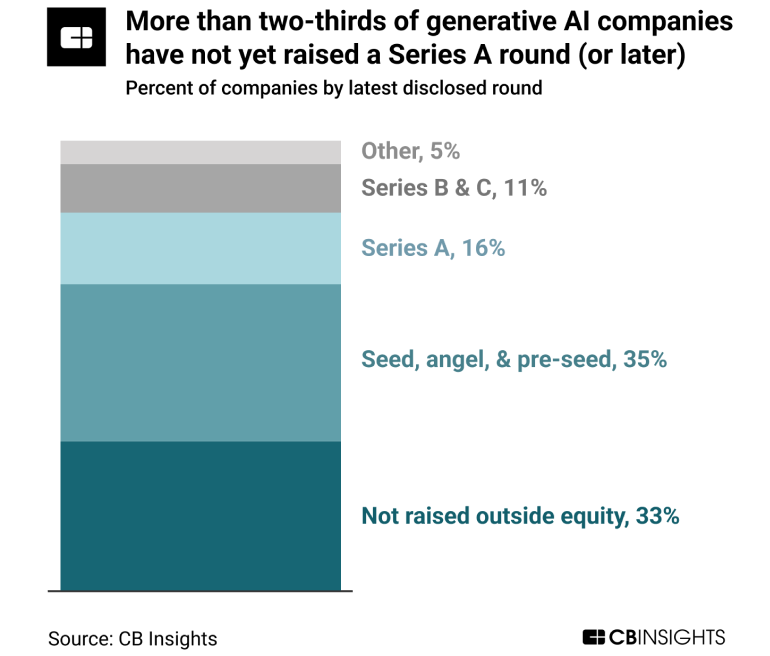Generative AI start-ups were already hot with VCs, ChatGPT just poured fuel on the fire.
Investing in AI: Venture capital investment in the field has skyrocketed 495% since 2020, reaching $1.37bn this year (Pitchbook, 2022). ChatGPT maker OpenAI, which is on the verge of a record valuation, largely driven by Microsoft, is just one example of the potential for growth in the space.

👉Companies like Character and Anthropic are seeking unicorn valuations, and others like Jasper, Stability AI and DeepL were cashing in on the hype even before Microsoft's OpenAI deal. (If interested, check out the list of over 100 generative AI startups (Stanford University.))
👉The generative AI space is nascent. More than two thirds of generative AI companies have not raised a series A round or later (CB Insights, 2022).

What is Generative AI?
If you are not familiar with ChatGPT or Generative AI, picture it like a chef blending ingredients to create a unique dish, drawing on their knowledge and experience. Similarly, Generative AI can produce a range of original content, from music and art to insightful analogies like the one you just read. And it's not just for fun - it also has numerous practical applications, such as developing new product designs and streamlining business processes.
How should investors approach AI?
We asked our Investment Analyst, Sebastian who is completing his Masters of Data Science and AI about how investors should approach this new megatrend.
"Start-ups adopting this technology are either creating proprietary models or building on existing foundation models. Given the large investment required to collect and process big data, most are opting for the latter…with the help of APIs and open-source tools, entrepreneurs can construct foundation models, achieve quicker monetization and concentrate on specific industry verticals. In other words, if new AI startups like Jasper are plants, OpenAI is the soil which helps them grow.
That being said, as the hype phases out, companies that are able to make initial investments in creating their own base models ‘soil’ are likely to have a long-term advantage of supervision, training and testing their own models, and mitigating any inherent biases that may be present in existing open-source models.”
Investing in AI models, or businesses building upon them?
This isn’t to say that an investment in companies building on OpenAI’s or other models with less and more parameters is a bad idea, but it certainly requires an increased amount of due-diligence and risk assessment. What value are these companies adding to OpenAI’s (or other researcher’s) models? How replicable is it? How resilient are they to a change in monetisation, regulation or access to their models?
AI and ML have the potential to become the largest enablers for technological advancements in organizational processes and creative ideation. Customers are becoming increasingly cost-conscious, and businesses must focus on preserving margins and maintaining pricing power to succeed. Companies that adapt and incorporate these innovations will reap the rewards of improved performance and competitive edge over those who don’t embrace it.
Keep in mind that this is only a small part of the vast potential uses of AI. AI and ML sits at the heart of almost every aspect of our daily lives, from transportation and manufacturing, to biotechnology and social media. According to ARK, AI could increase global labor productivity to ~$200 trillion and increase the productivity of knowledge workers more than 4-fold by 2030.
For those looking to access direct investments on the frontier of this AI revolution. We are approaching the launch of Empress Capital venture fund on the Stropro platform. Empress Capital, led by Yash Varma backs early stage Australian & New Zealand Artificial Intelligence Companies, and have already invested in companies such as Airseed Technologies and Quintessence Labs.




.png)
